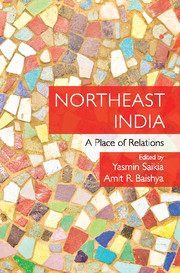Book contents
- Frontmatter
- Contents
- List of Figures
- List of Boxes
- List of Tables
- Acknowledgments
- Introduction
- Section I Contemporary Politics and Issues of Definition
- Section II Creating Presence
- Section III Knowing through Experience
- 7 Dismembered Lives: Narrating History's Footnotes in Aulingar Jui
- 8 Freedom and Frustrated Hopes: Assessing the Jadonang Movement, 1917-1932
- 9 Celebrating a New ‘New Year’ in Tripura: Space, Place and Identity Politics
- Section IV Rethinking Politics
- Glossary
- About the Contributors
- Index
9 - Celebrating a New ‘New Year’ in Tripura: Space, Place and Identity Politics
from Section III - Knowing through Experience
Published online by Cambridge University Press: 23 July 2017
- Frontmatter
- Contents
- List of Figures
- List of Boxes
- List of Tables
- Acknowledgments
- Introduction
- Section I Contemporary Politics and Issues of Definition
- Section II Creating Presence
- Section III Knowing through Experience
- 7 Dismembered Lives: Narrating History's Footnotes in Aulingar Jui
- 8 Freedom and Frustrated Hopes: Assessing the Jadonang Movement, 1917-1932
- 9 Celebrating a New ‘New Year’ in Tripura: Space, Place and Identity Politics
- Section IV Rethinking Politics
- Glossary
- About the Contributors
- Index
Summary
Introduction
Contemporary state-sanctioned commemoration practices in Tripura suggest a discomfort with the dominant narrative of the place – a narrative of shared history between Tripuris and Bengali Hindu. This is evident in the ways in which the state, especially over the last one decade, sought to re-inscribe or re-create a particular version of collective memory by renaming important sites in Agartala. This reinvigorated effort, in promoting a certain version of collective memory in public spaces, points to a complicated political present animated by new modes of Tripuri ethno-nationalist struggle as well as the imagination of Tripura by various political movements taking place in Northeast India. The invention of a new Tripuri New Year represents a new mode of ethno-nationalist struggle, and the narration of Tripura, by various political formations in the region, as a place where indigenous populations became ‘victims’ of immigration. Tripura then is an example of what other ethnic groups in the region should not become. This paper is an attempt to tease out these geographical impulses, which stages a contentious memory making and complicates modern identity politics in Tripura.
Throughout this paper, my effort will be to explain the discomfort I alluded to earlier. I will attempt to do this by historicizing the invention and celebration of a new form of New Year, Tring. My primary task here, then, is to show how and why this celebration upsets dominant narratives of Tripura as a place. As such, I will be dwelling on the making of modern Tripura quite extensively. My preliminary conclusion is that Tring incorporates both a celebratory wish and a sorrowful impulse, and this conflation animates a complicated politics of identity and repression in modern Tripura. I would like to clarify that much of my conclusion on celebration, loss and mourning are preliminary and require further research.
Perhaps, the starting point for my attempt to historicize Tring, and the discomfort such invention and celebration evinces in the state, can be located in the ways the Tripura state celebrates itself. Of course, this should not in any way be interpreted as if I am denying such self-celebratory acts by other states, or that this is unique to Tripura.
- Type
- Chapter
- Information
- Northeast IndiaA Place of Relations, pp. 201 - 222Publisher: Cambridge University PressPrint publication year: 2017
- 1
- Cited by



